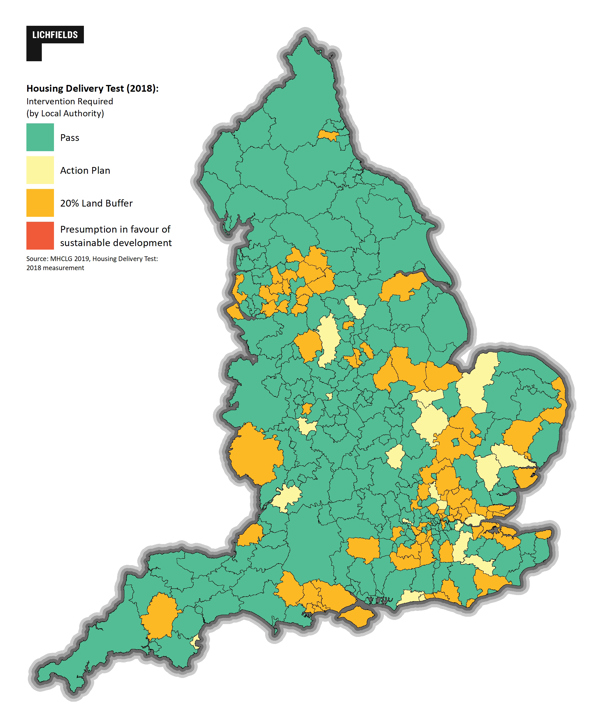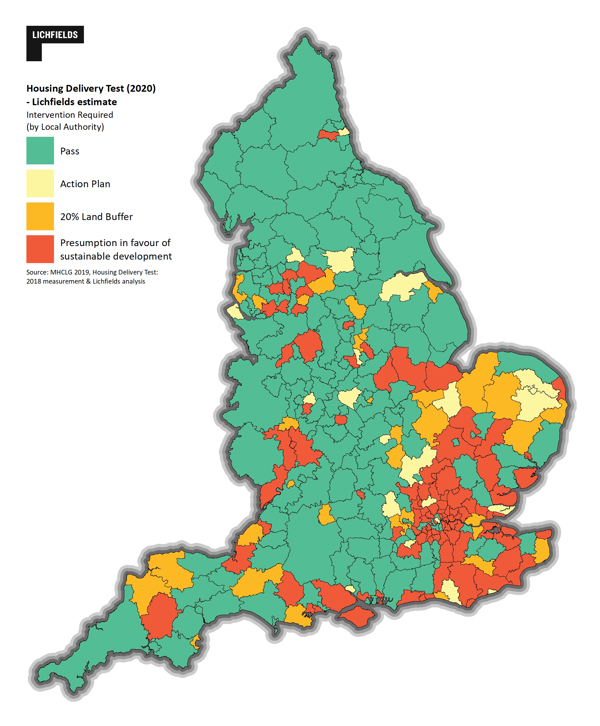| |
|
|
|
|
|
Headline news
|
|
|
|
01
|
|
|
|
| |
02
|
|
|
|
|
|
Law and policy news
|
|
|
|
03
|
|
|
|
| |
04
|
|
|
|
|
|
Other news
|
|
| |
05
|
|
|
|
| |
06
|
|
|
|
|
|
07
|
|
|
|
| |
|
|
|
|
Results of the first Housing Delivery Test published alongside NPPF and PPG updates
Housing Delivery Test 2018 results
The outcomes of the first Housing Delivery Test were published and took effect on 19 February. Figure 1 shows the outcomes of the test by local planning authority; a quarter of authorities require a 20% land buffer to be applied to their five year housing land supply and/or for an action plan to be prepared, six in ten of which are in London or the South East.
Lichfields’ interpretation of planning practice guidance is that in areas where a land buffer has already been applied due to persistent underdelivery, the buffer will not increase beyond 20%, because only one of the three types of buffer should be applied depending on the specific circumstances; buffers are not cumulative (albeit that individual circumstances could lead to a bespoke approach because buffers are policy rather than law).
 Figure 1: Housing Delivery Test (2018), intervention required by Local Authority
Figure 1: Housing Delivery Test (2018), intervention required by Local Authority
Figure 2 shows the anticipated outcome of the test in 2020, based on the methodology used to calculate the 2018 test and current delivery rates being maintained; a third of local planning authorities would face the presumption in favour of sustainable development, mostly in London and the South East.
Figure 2: Housing Delivery Test (2020) - Lichfields estimate, intervention required by Local Authority
Earlier in the month a National Audit Office (NAO) report had raised concerns about the standard method for assessing minimum annual housing need, and for holding local authorities accountable for the delivery of housing (see below).
Housing Delivery Test: 2018 measurementHousing Delivery Test results 2018, Lichfields’ Think Tank on twitterAnticipated Housing Delivery Test results 2020, Lichfields’ Think Tank on twitter
Updated NPPF and ‘Housing and economic needs assessment’ PPG published
Alongside the publication of the Housing Delivery Test results, the Government has published its response to the technical consultation on updates to national planning policy and guidance (October 2018).
As a consequence, updated versions of the revised National Planning Policy Framework (NPPF) and of the ‘Housing and economic needs assessment’ Planning Practice Guidance (PPG) have been issued.
The revised NPPF and PPG have been updated to respond to the September 2018 publication of the 2016-based household projections, which generated lower minimum housing needs figures nationally. Specifically, the Government has confirmed that the 2014-based household projections should be used to provide the demographic baseline for the Standard Method for a limited period of time; over the next 18 months the Government will review the Standard Method formula with the intention of establishing a new approach that could better meet the Government’s aspirations for housing.
Moreover, the Government confirmed that the 2016-based household projections should not be used as a justification for lower housing targets and has amended the ‘Housing and economic needs assessment’ PPG to state this.
The PPG has been updated to re-introduce specific paragraphs on economic need assessments, which were removed in the previous iteration of the PPG following the publication of the revised NPPF in July 2018.
Finally, the proposed clarifications and minor changes to the revised NPPF in relation to footnote 37, paragraph 177 (to improve alignment with the Habitats Regulations), and glossary definitions of “local housing need” and “deliverable” have all been taken forward by the Government. An updated version of the NPPF has been published to reflect these clarifications and minor amendments.
MHCLG, Government response to the technical consultation on updates to national planning policy and guidanceMHCLG, National Planning Policy Framework, February 2019MHCLG, Housing and economic needs assessment Planning Practice Guidance
| |
|
|
|
Quote of the month
|
|
| |
|
|
| |
|
|
| |
I believe that there are some relatively simple changes that can make it a shorter process, which is easier for all parties. I’ve been impressed by how willing all stakeholders are to see change and how much agreement there has been between all parties to the change that is required […] but they also need to support it in practice!
Bridget Rosewell OBE, in the foreword to the Executive Summary of her “Independent Review of Planning Appeal Inquiries” |
|
| |
|
|
Proposed legislation: Defra consults on whether conservation covenants should be introduced
The Government is consulting on the introduction of conservation covenants, following a commitment to do so in its 25 Year Environment Plan.
According to the Government, there is currently no legal mechanism for those wishing to secure lasting conservation benefit. The consultation, which runs until 22 March 2019, says:
“A conservation covenant is a private, voluntary agreement between a landowner and a “responsible” body, such as a conservation charity, government body or a local authority. It delivers lasting conservation benefit for the public good. A covenant sets out obligations in respect of the land which will be legally binding not only on the landowner but on subsequent owners of the land”.
Defra, Gove unveils new covenants to protect natureDefra, Conservation Covenants consultation Defra, 25 Year Environment Plan
A consultation on main modifications to a Local Plan should have explained proposed changes to Proposals Map
A High Court judgement has found that an amenity group was substantially prejudiced by a consultation on main modifications to a Local Plan that did not make clear that a site was no longer to be designated as Local Green Space (LGS); this could only be understood by also reading the Inspector’s Report, which did not form part of the consultation on the main modifications.
The amenity group Mr Jopling represented, which sought the designation of playing fields as LGS, did not respond to the consultation regarding the main modifications to the London Borough of Richmond as it did not appreciate the implication would be the de-designation of the playing fields. After the consultation ended, prompted by the responses submitted by the developer, Mr Jopling read the Inspector’s Report and wrote to the Council raising his concerns and providing a detailed response to that Report.
The Council considered Mr Jopling’s case to be robust but said (with reference to “para 5.2.4. of Planning Inspectorate guidance”) that the de-designation of the site was not a Main Modification because it was an amendment to the Proposals Map, and the Council was bound by the content of the Inspector’s Report. The Council adopted the Plan.
The judge held:
“[...] this reading of paragraph 5.2.4 and what the Inspector was doing, was misconceived. In truth the de-designation was an MM [main modification] but expressed very obliquely.”
Accordingly, Jopling’s principal ground of challenge to the adoption of the Local Plan succeeded on the basis that the consultation process was manifestly unfair and therefore a procedural requirement in connection with the adoption of the local plan was not complied with. The arguments in favour of designation clearly showed that the de-designation of the site might not have happened if Mr Jopling had had a proper opportunity to take part in the consultation.
Paragraph 5.28 of the Plan was quashed by a Court Order and LBR is currently carrying out a six week consultation in respect of paragraph 5.28 of the Local Plan. The consultation now explains “The effect of this change represents the proposed removal of the Local Green Space (LGS) designation from Udney Park Playing Fields (UPPF) (based on paragraphs 68 and 69 of the Inspector’s Report April 2018)”.
Jopling v Richmond Upon Thames London Borough Council and Another (2019)Local Plan –Consultation on Proposed Main Modification, London Borough of Richmond
Report on the planning appeals by inquiry process seeks to halve planning appeal inquiry timescales
The independent review of planning appeal inquiries, led by Bridget Rosewell OBE, was published on 12 February. It concludes that its 22 recommendations should lead to planning appeal inquiry decisions determined by an Inspector being made 24 weeks from receipt in 90 per cent of cases (currently 47 weeks on average), and all recommendations to the Secretary of State being submitted within 30 weeks from being made valid (currently one year on average).
The report says that the timescales for inquiries reflect the way the system operates and the actions of the parties involved; scheme specific variables had only a marginal impact on timescales.
The principal areas recommended for improvement are:
- earlier engagement by all parties (initiated by the Inspector, who would be identified within 7 weeks of the start date)
- greater certainty about timescales (ensuring only complete appeals are submitted, PINS leading on determining an inquiry date again)
- harnessing technology to improve efficiency and transparency
Other recommendations of note include:
- ensuring the launch of a Planning Appeal portal by December 2019 (with testing to start in May 2019)
- requiring appellants to notify the local planning authority of their intention to appeal and request an inquiry at least ten working days before the appeal is submitted
- MHCLG consulting on appellants contributing to the accommodation costs of an inquiry
- Planning Inspectorate and MHCLG regularly discussing the practical impact of the of policy and guidance on the consideration of evidence at inquiries – potentially finding scope for changes that address unnecessary concern or ambiguity
- The ‘model letter’ notifying interested parties of an appeal should make clear that those who want Rule 6 status should contact the Inspectorate immediately
- Inspectors’ workloads should allow for a case to be written up immediately after the inquiry (where at present they often go straight from one inquiry to another)
- Minimising the number of cases that need to be decided by the Secretary of State – to be kept under review by MHCLG
- Monitoring why appeals are withdrawn (c.100 per year) and initiating a costs award where there is evidence of unreasonable behaviour.
The Government’s press release says it will respond to the report “in the coming months” but the same press release suggests the recommendation is that PINS prepares an action plan by April 2019 and that the “implementation plan” being prepared “will set out precisely how it will deliver these recommendations”.
The report does not make direct reference to the drop in the number of Inspectors since 2014, referred to in the NAO report on the planning system (see below):
“The biggest decreases have been in the number of support staff and of ‘band 2’ inspectors, the latter of which dropped from 129 in 2010 to 75 in 2018. The number of ‘band 3’ inspectors, the most experienced staff, has fluctuated but decreased since 2016 from 44 to 38 in 2018, despite an increase in its complex casework, including validating local plans”.
MHCLG, Independent review of planning appeal inquiries: reportMHCLG, Planning appeal decisions could be cut by 5 months
Local Plan interventions: Communities Secretary letters to Wirral and Thanet DC
The Communities Secretary, James Brokenshire, has published the letters that he sent to Wirral Council and Thanet DC at the end of January providing updates regarding his Local Plan intervention; he is not taking over preparation of their local plans at present.
The Communities Secretary has directed both Councils to designate a lead Councillor and lead official to be responsible for progressing the Local Plan preparation (Wirral within ten weeks, and Thanet within four weeks from the date of his letters); and Wirral has to publish an action plan setting out the actions it will undertake to get a Local Plan in place within ten weeks.
The letters state the Communities Secretary will keep monitoring the Local Plans progress and will consider taking further actions if the Councils fail to make progress as he had directed.
Related to this, a written answer by Housing Minister Kit Malthouse this month confirmed that MHCLG would seek to avoid taking over the preparation of a plan but “intervention may be necessary as a last resort”.
MHCLG, Local Plan Intervention letter to Wirral CouncilMHCLG, Local Plan Intervention letter to Thanet DCLocal Plans: Written question
NAO reports raises concerns over housing delivery test, standard method and appeals system
The National Audit Office (NAO) has published a report looking at how effectively MHCLG "supports the planning regime to provide the right homes in the right places".
The findings of the report raise serious concerns about the Ministry’s capacity to support the delivery of 300,000 new homes per year. Specifically, the report considers that local authorities have struggled to produce up-to-date local plans, and that the Standard Method for assessing housing needs has weaknesses and will need to be revised.
It concludes that while the Standard Method poses a challenge to the local authorities in the four out of nine regions that will see an increase in the numbers of homes they need to plan for, the methodology reduces the numbers of new homes needed in other regions. The report says the reduction “could hamper local authorities’ plans to regenerate and stimulate economic growth”.
Moreover, the Report also recognises that the Ministry holds local authorities accountable for the delivery of housing (via the Housing Delivery Test) although this is not fully within local control.
The Report discusses the financial pressures on local planning authorities, particularly given the need to comply with new requirements set out in the revised NPPF. It also observes that MHCLG has not performed detailed checks as to whether local authorities have spent the additional 20 per cent income generated on planning.
The Report also considers the way infrastructure is funded is complex and lacks cohesion and certainty, and “the system to get contributions from developers towards the cost of infrastructure is not working effectively… Developers can use the planning system to pay less in contributions than agreed”.
It found that the Planning Inspectorate struggles to determining appeals in a timely matter and "acknowledges its performance is unacceptable" (see also the above item on the Report on the planning appeals by inquiry process).
Finally, the Report provides five recommendations for the Ministry to support the planning system in working more effectively. Specifically, the recommendations focus on improving the monitoring of housing need assessments; assessing the potential implications of local authorities failing the Housing Delivery Test; revising performance metrics for dealing with applications and appeals to reflect performance more fully; cooperating with other Government departments and local authorities to ensure needed infrastructure is funded and delivered; and working with stakeholders to research skills gaps in local authorities’ planning teams.
In relation to this final point, the Housing Minister said in a written answer of 27 February: “The Government recognises that having well-resourced and skilled planning departments is essential for the delivery of our ambitious housing programme. We are working with the Local Government Association and the Royal Town Planning Institute to understand the resourcing and skills needs in council planning departments”.
National Audit Office, Planning for new homesPlanning: Skilled Workers:Written question
| |
|
|
|
The Lichfields perspective
|
|
| |
|
|
| |
|
|
| |
|
|
| |
The long-awaited inaugural results from the Government’s Housing Delivery Test for 2018 came out this month. The results enable us to take fuller account of unmet housing need and communal accommodation flows (including student housing). The accompanying guidance also clarifies the treatment of joint plans and refines its explanation of pro-rata arrangements in each measurement year of the test. Looking forward to the test results in November 2020 when the test takes full effect (requiring a minimum of 75% delivery against need), we estimate that a third of authorities would face the ‘presumption in favour of sustainable development’ if current delivery rates hold.
Edward Clarke, Associate Director |
|
| |
|
|
| |
|
|
Disclaimer: This publication has been written in general terms and cannot be relied on to cover specific situations. We recommend that you obtain professional advice before acting or refraining from acting on any of the contents of this publication. Lichfields accepts no duty of care or liability for any loss occasioned to any person acting or refraining from acting as a result of any material in this publication. Lichfields is the trading name of Nathaniel Lichfield & Partners Limited. Registered in England, no.2778116




